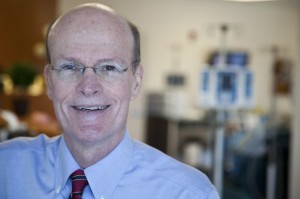***The following post was written by Dr. John Fetting at the Johns Hopkins Kimmel Cancer Center.
Another successful Breast Cancer Awareness Month is coming to a close. We have raised the national consciousness, encouraged screening, touted the benefits of treatment, celebrated an ever-growing number of survivors, and honored those who fought bravely but died.
Still, the number of women around the world who have their lives suddenly and forever changed by this terrible disease continues to increase. This must stop. A steady increase in the incidence of breast cancer is not inevitable. Preventing breast cancer is not too hard, too big, or too expensive.
Curing breast cancer has a face. It is the face of our wife, our mother, our sister, our daughter. We take curing breast cancer personally. Not so, with prevention. For the most part, we can’t identify those who are destined to get breast cancer. Until they are diagnosed with it, they are faceless.
Preventing breast cancer will be hard work. First, we need to identify strong risk factors that predict who will develop breast cancer. Some of the risk factors we identify today, such as early onset of menstruation and first pregnancy after age 30, are not all that predictive or helpful. They are only indirectly related to the development of breast cancer and account for such modest increases in risk that most women with these risk factors will not develop the disease.
The strongest risk factors are biological and genetic changes occurring in the breast, which mark the path from normal breast to breast cancer. An example of a strong risk factor is a mutation in BRCA1 or BRCA2 genes. About five to ten percent of breast cancers are caused by a mutation in these genes. Most women with one of these mutations will get breast cancer. There is no doubt about their risk; there is no doubt about their need for prevention.
Most breast cancers, however, will be caused by multiple genetic and biologic changes, and finding the right combinations of these changes for predicting high risk for the disease is our task.
Once we identify these changes and the women at highest risk, we can develop and test interventions to prevent the disease. Whether an intervention is a dietary supplement or drug, it can’t be burdensome—in cost or side effects. Prevention drugs used today, including tamoxifen, raloxifene, and exemestane, halve the risk of breast cancer but come with troublesome side effects.
Make no mistake, to prevent breast cancer we need to make the kind of single-minded, determined effort that has characterized our effort to cure breast cancer. Anything less will take a very long time or fail altogether. Support for basic and applied prevention research will be expensive, and government and pharmaceutical funding cannot be the sole sources of funding. Private philanthropy and grassroots fundraising will be essential.
I attended the Maryland Susan G. Komen Race for the Cure last Sunday. And as I watched the runners and walkers stream past the start line, I was impressed that this group was on a mission. They are out to cure breast cancer. As the T-shirts of one team proclaimed: “Defeat is not an option.”
There were thousands of girls and young women walking or running. Why were they there? Some had a very personal stake because a loved one had been affected. Others supported a friend or classmate whose mother, sister, or grandmother was affected. I saw groups representing their school or church in an expression of commitment to this cause. They radiated enthusiasm and camaraderie. They did not seem afraid or to feel particularly at risk. But some of them are at risk. We need to figure out who they are and take steps to prevent their breast cancer. These are the faces of prevention. We owe it to them.
John Fetting, M.D.
Associate Director for Clinical Practice
Associate Professor
Sidney Kimmel Comprehensive Cancer Center at Johns Hopkins
***Note: The John Fetting Award in Breast Cancer Prevention has been established to fund the most promising research in breast cancer prevention. Applications will be granted to the most promising work for a two-year period. The John Fetting Award is led by breast cancer survivor and advocate Leslie Ries. Her video documentary, Letters to My Daughters, chronicles her inspiring story and mission to help prevent breast cancer.
Additional Resources:
C-Answers video series: Dr. Fetting discusses breast cancer prevention
Support Breast Cancer Prevention Research at Johns Hopkins
